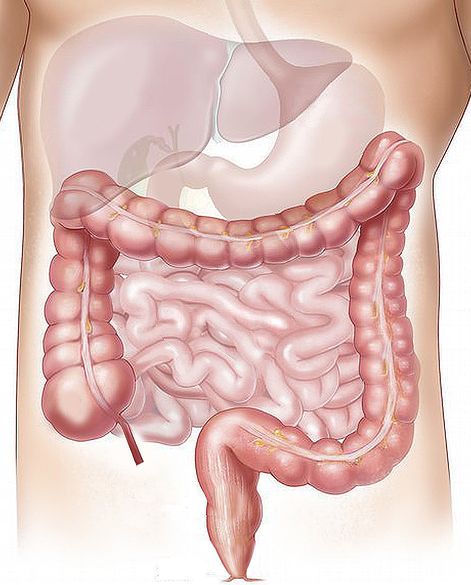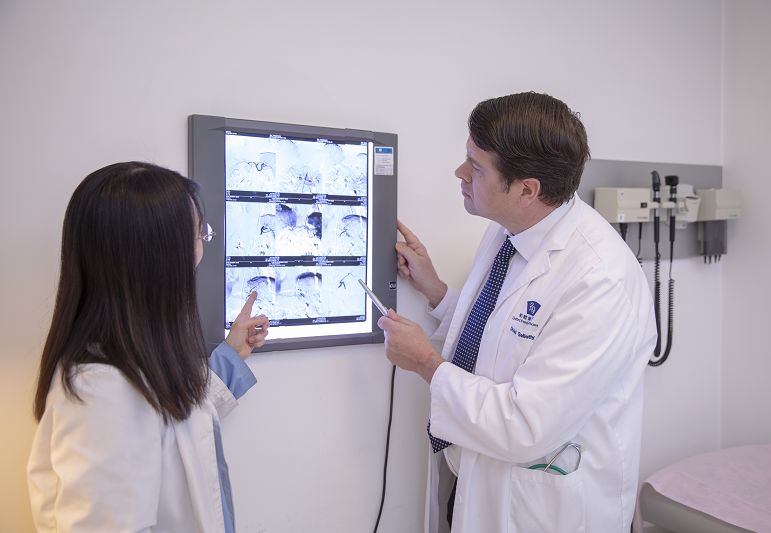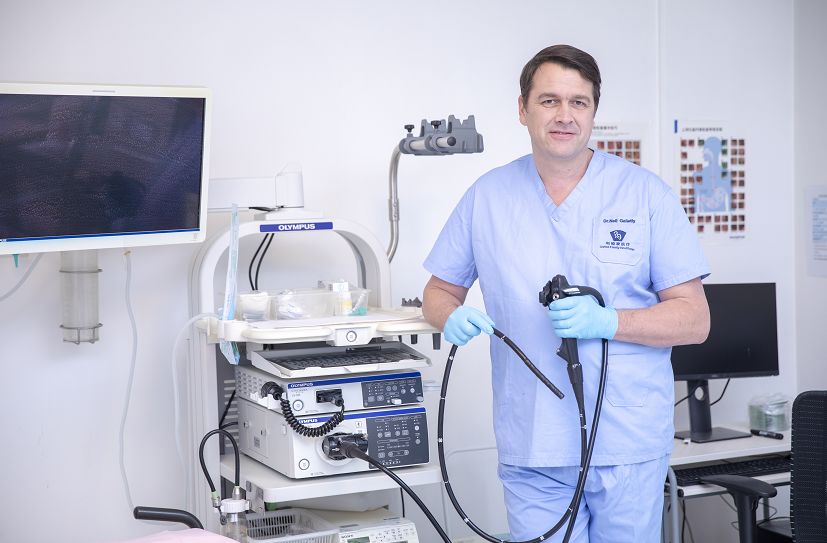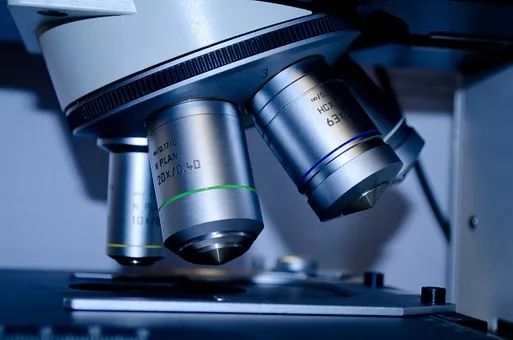
- This event has passed.
MEMBER EVENT | Colon Cancer Awareness Month
03-01-19 - 03-31-19

March is Colon Cancer Awareness Month at Beijing United Family Hospital (BJU). Colon cancer is a common cancer and, sadly, many people die each year from the disease. But colon cancer is preventable, treatable, and beatable – and taking part in regular colon cancer screening is a great way to do this. Here, we talk to Dr. Neil Galletly, Consultant Gastroenterologist and Chief of the Digestive Disease Center and Endoscopy Center at BJU, to find out more about colon cancer screening. Scroll to the bottom of this article to find out how to score a free colon cancer consultation and a discounted colon cancer scan at BJU in March.
You probably don’t give much thought to what goes on in your colon – and colonoscopies and poop tests are hardly topics for dinner-table conversation. However, I do want you to know that spending a few minutes thinking about colon cancer screening is absolutely imperative. These tests have the potential to save your life because they can catch cancer early on or before it is even fully developed.
Colon cancer (also called bowel cancer or colorectal cancer) is a cancer arising from the lower part of the intestines – the colon (also known as the large bowel or large intestine) or the rectum. In most Western countries, colon cancer is one of the leading causes of cancer death and one of the top four most common cancers. In China, colon cancer has previously been less common than in Western countries, but rates have been rising over the last 20 years and colon cancer is now the fifth most common cancer in China.
Why should I do colon cancer screening?
Taking part in colon cancer screening can save your life. It significantly reduces your chances of dying from colon cancer. There are two important reasons for this – early detection and prevention.
Let’s talk about early detection first. Early colon cancer often causes no symptoms, so people may be unaware they have a cancer growing inside their colon. Cancer screening is a way of testing healthy people before they develop symptoms to help detect cancer at an early stage. It is important to detect colon cancer as early as possible to maximize the chance of curative treatment. In fact, nearly everyone who is diagnosed in the earliest stages will survive colon cancer and the chances of it returning within five years are small.
Early detection of cancer is therefore very important – but, in my opinion, an even more important benefit of colon cancer screening is that it can prevent you from ever getting colon cancer in the first place. To explain why, you need to understand a little bit about how colon cancer develops from polyps.
Polyps are small growths on the inside lining of the colon. They are relatively common in people over the age of 50. Some of these polyps (adenomas) have the potential to develop into cancer – and most colon cancers start off as precancerous polyps. Colon cancer usually develops slowly over many years – it is estimated that it takes over 10 years for a polyp to grow and to develop into a cancer. By detecting and removing precancerous polyps by colon cancer screening, colon cancer can be prevented.
Who needs colon cancer screening?
Colon cancer screening is for everyone. People don’t think they can have colon cancer if they feel OK, but they most certainly can. By the time symptoms are displayed, the cancer may have advanced to a higher stage. Regular screening is the key to detecting colon cancer in its early stages or before it develops. If you are putting off screening because you don’t have symptoms, you’re defeating the purpose of the screening.
Most countries recommend regular screening for colon cancer for the general population as part of their routine healthcare.
When should I start colon cancer screening?
Almost all international guidelines recommend starting colon cancer screening at the age of 50 years for so-called “average-risk” individuals, and continuing to the age of at least 75 years. However, as I mentioned earlier, colon cancer is becoming more common in younger adults. In view of this trend, the American Cancer Society last year recommended starting colon cancer screening for average-risk individuals at age 45 rather than 50. After the age of 75, individuals and their doctors can decide together whether continued screening is necessary.
The frequency of screening depends on the test used – colonoscopy should be repeated every 10 years (unless previous tests have been abnormal) whereas stool testing for occult blood should be repeated every one to two years.
If you have a higher-than-average risk of developing colon cancer (more on this below), your doctor may recommend starting screening at an earlier age and performing screening more frequently.
How is the screening done?
The exact guidelines and recommendations vary from country to country but almost all recommend either colonoscopy or high-sensitivity fecal occult blood stool testing as the screening methods of choice.
A colonoscopy involves a trained endoscopist inserting a thin, flexible tube with a camera and a light on one end to look inside your bowel. The procedure is quick and painless – it typically takes around 30 minutes and is performed using deep sedation so that you will not feel or be aware of the test. You will be able to go home once the effects of any anesthetic or sedative have worn off. The doctor will be able to see if there are any polyps. Any polyp found can usually be removed during the colonoscopy, and biopsies can also be taken of any abnormal or suspicious areas. Colonoscopy is a commonly used procedure and complications are very rare.
Colonoscopy plays an important role in colorectal cancer prevention. It is considered the gold standard of colon cancer screening methods for its ability to view the entire colon and to both detect and remove polyps during the same procedure. It is the only test that is suitable for individuals who have risk factors such as family history of colon cancer (more on this below).
The most accurate stool test for occult blood is the fecal immunochemical test (FIT). Colon cancer – and sometimes larger polyps – can bleed easily and release blood into the stool. In early cancers (or large polyps), the amount of blood may be very small and would not be noticed if you looked at the stool. The FIT test uses antibodies to detect hidden traces of blood in the stool. Unlike older, less accurate stool tests, only one sample is required, making it a less-fiddly test. If the test is positive, you will need a colonoscopy to look for polyps and cancers. Studies have proven that stool testing for occult blood reduces the number of deaths due to colorectal cancer by as much as 30 percent.
Other colon cancer screening tests available at BJU include flexible sigmoidoscopy, CT colonography (virtual colonoscopy), and stool testing for cancer DNA. Although these tests are less often recommended as first-line screening tests than colonoscopy or the FIT stool test, they can all help detect early cancers – and any test is better than no test. Talk to your Family Medicine doctor or one of our experts from the Digestive Disease Center about which test is right for you.
What about blood tests?
It would be great if the presence of early cancers or polyps could be detected by a simple blood test. Patients could then have the test done as part of their annual blood tests, and they wouldn’t have to think twice about it. Sadly, however, there are currently no blood tests that can replace colon cancer screening by colonoscopy or stool tests. There are blood tests that can help detect late-stage cancers – but by then it might be too late to get treatment.
What about people with a higher risk of developing colon cancer?
Some people have a higher than average risk of developing colon cancer. The risk factors that might put you in one of these higher-risk groups include:
• Family history
Although most people with colon cancer do not have a family member with the disease, 10-20 percent of people who are diagnosed with colon cancer do have a family member with colon cancer. If a close family member (e.g. parent, sibling, child) has had colon cancer or colonic polyps, then your risk for colon cancer may be higher than average. If several family members have had colon cancer, the chances increase even more.
• Previous colon cancer or colonic polyps
• Previous uterine or ovarian cancer
Women diagnosed with uterine or ovarian cancer before age 50 are at an increased risk of colon cancer.
• A history of inflammatory bowel disease (IBD)
People with ulcerative colitis or Crohn’s disease affecting the colon have a higher risk of developing colon cancer and should have regular screening colonoscopies.
• Ethnicity
Studies in the USA show that black people are at an increased risk of developing colon cancer. US guidelines recommended starting colon cancer screening at age 45 in black people.
If you have any of the above risk factors that give you a higher than average chance of developing colon cancer, you may need more frequent screening tests or to start screening at an earlier age. You should speak with a gastroenterologist about screening at an earlier age and find out how often you need to be screened. In individuals with a higher risk of colon cancer, it is strongly recommended that you use colonoscopy (rather than stool tests or other screening modalities) for screening.
Colon Cancer Awareness Month at Beijing United Family Hospital
To promote Colon Cancer Awareness Month and to help you make colon cancer screening part of your routine healthcare, during March, the Digestive Disease Center at Beijing United Family Hospital is offering:
1. Free 15-minute colon cancer screening consultations (available mid-February until the end of March) to help you choose the appropriate screening test and follow-up screening plan based on your medical history and situation.
2. Screening colonoscopy appointments on Sundays to make it easier for you to fit colon cancer screening into your schedule.
3. 30% discount on self-pay colonoscopy and FIT packages.
To take advantage of these special offers, please make your appointment by calling the BJU Digestive Disease Center Reception at 5927 7050.
Please visit the Digestive Disease Center to discuss colon cancer screening in more detail with one of our gastroenterologists. Our team of experienced and internationally trained specialists are experts in colon cancer screening. We follow established international guidelines and recommendations for colon cancer screening and have access to state-of-the-art diagnostic equipment. We can explain the benefits of the various screening tests available and help you choose the appropriate test and screening frequency based on your medical history and situation. You will receive your results quickly and your doctor will explain any findings and recommend a course of treatment, if necessary. You will be treated with dignity and courtesy at all times and made as comfortable as possible.
Dr. Neil Galletly is BJU’s Section Chief of the Digestive Disease Center. To make an appointment with him, please call the BJU Service Center at 4008-919191.
You can find more information here.





